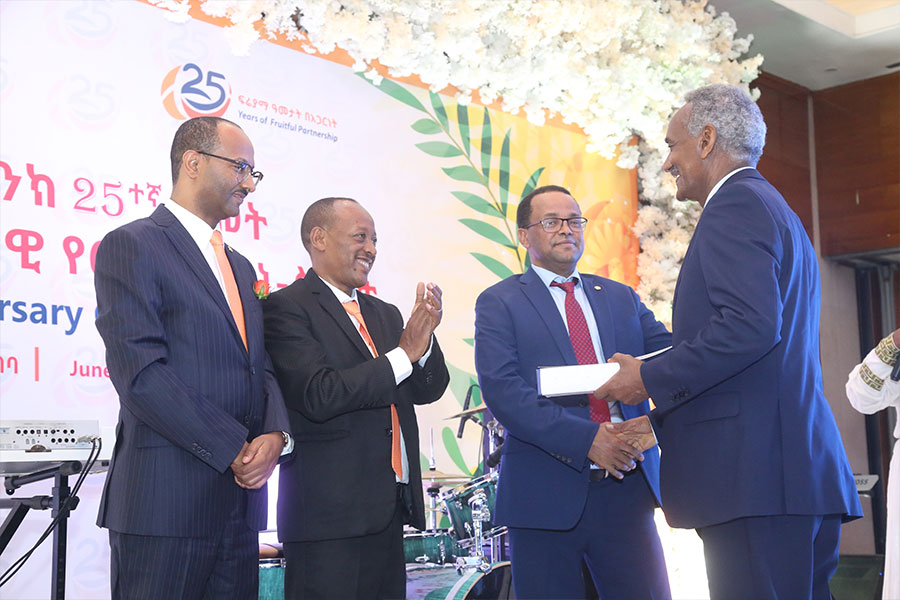
Fortune News | Jun 11,2022
Sep 16 , 2023
By BERSABEH GEBRE ( FORTUNE STAFF WRITER )
Ethiopia's Jubilee Palace is opening its doors to a medley of upscale restaurants and hotels, a transformation spearheaded by Prime Minister Abiy Ahmed (PhD).
As the refurbishment enters its final stages, establishments such as Ramada Addis Hotel, Mama's Kitchen Restaurant, and the burgeoning Dibabe Hotel & Lodge are actively carving out their respective niches in this historic locale on Menelik II Avenue, ready to usher in a vibrant era of culinary and cultural experiences. At the heart of this venture is a two-year contract that exempts these businesses from rental fees, an allure for the selected establishments invited to enhance the Palace's offering with global and local culinary delights.
As insiders from the National Palace Administration affirm, the refurbished Palace aims to open its gates for visitors by January next year, metamorphosing into a hotspot teeming with gastronomic adventures across various continents.
This endeavour conspicuously sidestepped an open public bidding process, with the chosen restaurants receiving invitations instead. They are tasked with infusing capital and crafting spaces that not only resonate with their brand but also harmonise with the Palace's intrinsic aesthetic fabric.
Leading the charge is Ramada Addis, a franchise of the Wyndham Hotel Group, which has been a formidable presence in the hospitality industry since 2016, after an investment of 30 million dollars.
The proprietor, Adugna Bekele, (the nephew of the business tycoon Getu Gelete) disclosed to Fortune that approximately 30 million Br has been channelled into renovation works initiated three weeks ago. Adugna envisions an attraction where visitors can immerse themselves in fine Middle Eastern dining experiences, a venture he anticipates will be rewarding.
“We expect a good return on our investment,” he told Fortune. “After all, we are in it for business.”
Adding a dash of local flavour to the mix is Dibabe Hotel & Lodge, a relatively fresh entrant with a five-year foothold in the industry.
The founding shareholder, Megerssa Feyissa, recounted signing an agreement with the Palace Administration last month, earmarking a robust investment of 52 million Br to craft an authentic Ethiopian touch through its interiors. He is betting on a slower return on investment trajectory, aspiring to reach a financial equilibrium in the years following the end of the grace period for the rental fee.
“We hope to at least break even,” he said.
The revered Jubilee Palace, spanning a grand 14,000sqm, has stood as a sentinel of history since its commissioning during Emperor Haileselassie’s reign, witnessing a succession of heads of state since the early 1990s. Alternatively called the National Palace, it was constructed by Varnero Construction in the 1950s, commemorating the 25th coronation of Emperor Hailesellasie I. The Emperor was crowned on November 2, 1930, in Addis Abeba, a significant event that marked the beginning of his reign, which lasted until 1974.
After the deposition of the Emperor, the Palace underwent several changes in its usage, although left unoccupied during the Derg, a military junta that ruled Ethiopia up until 1991. It became a residence for subsequent presidents in post-Derg Ethiopia, from Negasso Gidada (PhD) to Girma Woldegiorgis and from Mulatu Teshome (PhD) to the current occupant, Sahleworq Zewdie.
The Palace's design blends modern and traditional architectural elements, with an elaborated layout, incorporating spacious halls, a banquet hall, and other features considered highly modernised for its time.
Despite undergoing modest renovation in the 2010s, the Palace needed a substantial uplifting, which has been in progress over the past four years.
Infamous as the locus where the last Ethiopian Emperor was dethroned, originally slated to reopen this month, the Palace found new vigour and purpose under the French Development Agency's (AFD) funding. A grant of over one billion Birr, facilitated through a meeting between Prime Minister Abiy and French President Emmanuel Macron, is financing the revamp, which concurrently embraces the restoration of the rock-hewn churches of Lalibela in the Amhara Regional State.
Joining the foray is Mama's Kitchen, a ubiquitous name linked with various monumental recreational projects helmed by the Prime Minister, including ventures at Entoto and Unity parks. Although reticent about the exact financial blueprint of their project, the management revealed plans to occupy the erstwhile Royal Winery, serving a medley of French, Italian, and traditional cuisines.
However, this grand venture does not escape scrutiny.
Investment consultant Abnet Belay forewarns potential investors of the significant financial commitments involved, cautioning at the likelihood of steep food prices that could potentially deter clientele. He advises prudence, urging investors to refrain from rushing into this monumental project without viability studies.
"Such a huge financial investment should not be impulsive," he said, signalling a cautious yet optimistic outlook on this ambitious undertaking.
PUBLISHED ON
Sep 16,2023 [ VOL
24 , NO
1220]

Fortune News | Jun 11,2022

My Opinion | Oct 21,2023

Radar | Feb 18,2023

Commentaries | Jun 20,2020

Radar | Dec 12,2020

Dec 22 , 2024 . By TIZITA SHEWAFERAW
Charged with transforming colossal state-owned enterprises into modern and competitiv...

Aug 18 , 2024 . By AKSAH ITALO
Although predictable Yonas Zerihun's job in the ride-hailing service is not immune to...

Jul 28 , 2024 . By TIZITA SHEWAFERAW
Unhabitual, perhaps too many, Samuel Gebreyohannes, 38, used to occasionally enjoy a couple of beers at breakfast. However, he recently swit...

Jul 13 , 2024 . By AKSAH ITALO
Investors who rely on tractors, trucks, and field vehicles for commuting, transporting commodities, and f...

Jul 12 , 2025
Political leaders and their policy advisors often promise great leaps forward, yet th...

Jul 5 , 2025
Six years ago, Ethiopia was the darling of international liberal commentators. A year...

Jun 28 , 2025
Meseret Damtie, the assertive auditor general, has never been shy about naming names...

Jun 21 , 2025
A well-worn adage says, “Budget is not destiny, but it is direction.” Examining t...